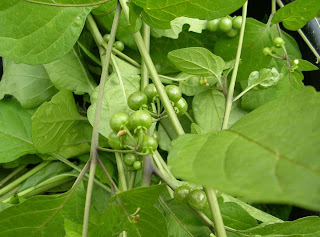Makoya - Manathakkali
Common name:
Black nightshade, Black-berry night shade, Nightshade, Poisonberry
Botanical
name: Solanum nigrum
Family:
Solanaceae (potato family)
Manipuri:
Leipungkhangga
Tamil:
Manathakali,Manathakkali
Hindi: Mokoi, Makoya
Malayalam:
Mulaku thakkali, Manithakkali
Telugu:
Kasaka
Marathi:
Laghukavali
Description:
Solanum nigrum is a plant, an annual weed that grows up to 60cm tall, is branched
and usually erect, growing wild in wastelands and crop fields. Alternate leaves
are ovate deep green with an indented margin and acuminate at the tip. Flowers
are white with yellow colored centre. The berries are green at early stage and
turn to orange or black when ripened.
Solanum
nigrum is used as both food and medicine. It has a history of medicinal usage.
In oriental medicine, it is considered to be anti-oxidant, anti-inflammatory,
diuretic and antipyretic. The Chinese believe that it is an anti cancer agent
and is good for cancers of the digestive system. It was a traditional European
medicine for infirmities that needed cooling. It was considered good for
cooling hot inflammation, ringworm, ulcers, testicular swelling, gout and ear
pain. It was also used for treating convulsions. The Arabs used the bruised
fresh leaves to erase pain and reduce inflammation. They also applied the
poultice of the leaves to burns and considered it good for ulcers. In India the
plant is noted for its antiseptic and anti-dysentric properties.
Solanum
nigrum's health benefits are many. The leaves are used in the treatment of
fever and diarrhoea. It is also used to get quick relief from cough, cold and
mouth ulcers. The fruits are used as a tonic and laxative. The boiled extracts
of leaves and berries are used to alleviate liver related ailments. The juice
from its roots is used for asthma and whooping cough.
Medicinal benefits:
- Its fruit is
used as a cosmetic; as rubbing its seeds on the cheeks helps remove freckles.
Children extensively eat the mature fruit. It has been used for diabetes as
well.
- In Northern
India, the boiled extracts of its leaves and fruits are used to alleviate the
discomfort caused by liver-related ailments, even in jaundice.
- The leaves
of black nightshade plant strongly promote perspiration, when ingested in small
amounts. They work to purge the bowels the next day.
- The juice of
the herb or an ointment prepared from it is externally applied to cure certain
skin problems and tumors.
- A decoction
of the stalk, leaves, and roots of black nightshade is beneficial for wounds
and cancerous sores.
- Its berries
are poisonous, but boiling them is believed to destroy the toxic substances and
make them safe to be used for preserves, jams, and pies.
- Freshly
prepared extract of the plant is effective in treating cirrhosis of the liver
and also works as an antidote to poisoning by opium.
- It is very
good for mouth sores and ulcers. Make a juice with the leaves and gargle with
it. Also chewing some leaves and keeping it in your mouth for sometime helps to
heal mouth ulcers.
- It is a
diuretic and hence helps in the discharge of urine. A decoction made from the
leaves and stem of the plant helps this purpose.
- The leaves
of the Solanum nigrum is a natural home remedy to treat digestive propblems.
The juice of the leaves is good for flatulence, peptic ulcers and dysentry. An
infusion of the plant is good for abdominal upsets.
- The leaves
and fruits are said to cure fever. A decoction made from fresh or dried leaves
helps to reduce fever.
- The powder mixed with warm water taken thrice a day for the duration of the period,
relieves painful periods. This should be continued for a couple of cycles.
- A decoction
of the berries and flowers of the Solanum nigrum is good for cough and cold.
Note: Siddha treatment is based on complete physical examination of the patient, Naadi diagnosis, and other diagnostic criteria of the disease. The content given in this article is purely meant for information and education purpose only. Kindly consult a Siddha physician before any sort of self medication.


No comments:
Post a Comment